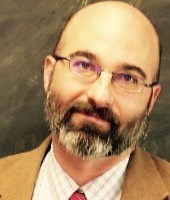Research Highlights
Dive Deep. Our faculty conduct research in all areas of philosophical thought, logic, ethics, and history. Through essays, articles, lectures, and books, faculty ask and answer the complex questions that cause society to reflect, consider, and evolve.
Below are a few faculty research highlights. See a full list of faculty in the department and their varied areas of teaching and research.
Research Highlights
Scott Aikin
 Associate Professor of Philosophy
Associate Professor of Philosophy
My work spans four areas of research: theory of knowledge, ancient philosophy, informal logic, and philosophy of religion. In theory of knowledge, I am focused on what it takes to be justified in holding a belief. Particularly, I am interested in what kind of reasons one must have and what the structure of those reasons must be. My work in ancient philosophy has been to investigate the variety of conceptions of knowing in Presocratic philosophy (primarily with Xenophanes) and in Hellenistic philosophy (primarily with the Stoics and Skeptics). My work in informal logic has been focused on epistemic appraisal of arguments and a correlate program for fallacy theory. And my research in philosophy of religion has been inspired by challenges to and conditions for knowledge of God’s (non)existence and His properties.
Jacob Barrett
 Assistant Professor of Philosophy
Assistant Professor of Philosophy
I work primarily in social, moral, and political philosophy. Much of my research is interdisciplinary; it brings social scientific tools and evidence to bear on moral and political questions, and so falls under the umbrella of philosophy, politics, and economics. Although I work on a wide range of topics, most connect to questions about social reform or improvement, such as: How should we theorize about social reform? What makes social institutions better or worse? How do social institutions function and change? And when and how should individuals contribute to efforts to promote social reform? I am especially interested in approaching these questions from a long-term and expansive perspective that attends both to our institutions’ long-run evolution and to their effects on people in other societies, on non-human animals, and on future generations.
See more about Barrett’s research.
Matthew Congdon
 Assistant Professor of Philosophy
Assistant Professor of Philosophy
Greg. S. Allen Dean’s Faculty Fellow in Philosophy
I am a philosopher specializing in ethics, social philosophy, and aesthetics. I write about emotions, interpersonal recognition, moral change, the aesthetics of interpersonal ethical life, and the intersections of ethics and epistemology. My work on these topics has appeared in The Philosophical Quarterly, Analysis, Philosophy, The European Journal of Philosophy, Episteme, and Philosophical Topics, amongst others.
See some of Congdon’s research papers and his latest book.
Karen Ng
 Associate Professor of Philosophy
Associate Professor of Philosophy
I specialize in nineteenth-century European philosophy (especially Hegel and German Idealism) and Frankfurt School Critical Theory. In addition to my research in post-Kantian philosophy, I’m also interested in the ongoing influence of Hegel and Marx for critical social theory, particularly as their legacies help us understand the relation between human beings and nature, possibilities and failures of mutual recognition, and conceptions of progress and critique.
Robert Talisse
 W. Alton Jones Chair in Philosophy
W. Alton Jones Chair in Philosophy
I specialize in contemporary political philosophy, with particular interest in democratic theory and political epistemology. In addition, I pursue topics in pragmatism, analytic philosophy, argumentation theory, and ancient philosophy.
